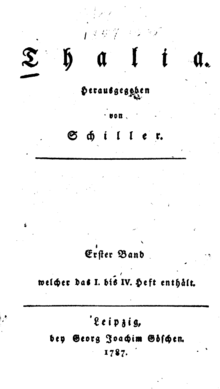Thalia (magazine)
| Thalia | |
|---|---|
| description | German magazine |
| publishing company | GJ Göschen'sche Verlagsbuchhandlung, Leipzig |
| First edition | 1784 |
| attitude | 1791 |
| editor | Friedrich Schiller |
Thalia was a magazine that Friedrich Schiller launched in 1784 during his time as a theater poet at the Mannheim Theater . The editor endeavored to maintain a high literary standard in this project. In addition, Thalia should also secure his livelihood, since Schiller did not get a permanent job in Mannheim.
Schiller worked as a journalist for magazines between 1782 and 1797. After the Wirtemberg Repertory, Thalia was his second journal project and the forerunner of the much more successful Horen . The project was announced in 1784 as "Rheinische Thalia". However, only the first issue, which appeared in 1785 and was dedicated to Duke Carl August von Sachsen-Weimar , had this title. The magazine was not selling well. From January 1786, the publisher Georg Joachim Göschen took over the organizational work, and by 1791 another 11 issues were published under the name “Thalia”. After an interruption due to Schiller's serious illness in 1791, the project was continued as Neue Thalia on Göschen's initiative from 1792–1793 .
The magazine took up historical, philosophical, literary and theater studies, and current reports from revolutionary France were also included. Schiller's preprints of Don Karlos and the Ghost Seer aroused great public interest . Although Friedrich Hölderlin , Georg Forster and Christian Gottfried Körner were able to be won as contributors, the claim to high quality could not be consistently achieved.
literature
- Matthias Luserke-Jaqui (Hrsg.): Schiller manual: Life - work - effect . Verlag JB Metzler, Stuttgart / Weimar 2005, ISBN 3-476-01950-0 .
